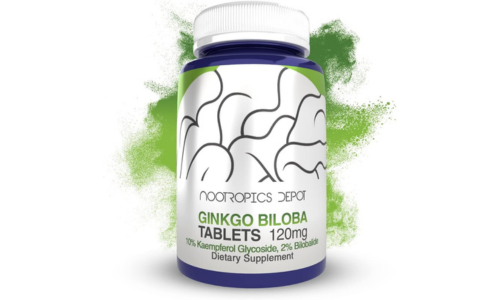
Step into the world of Ginkgo Biloba, a marvel of nature that predates dinosaurs and holds the key to enhancing memory and cognitive function. This ancient tree, with its distinctive fan-shaped leaves, is not just a living fossil but a treasure trove of benefits for the human mind. As we journey into the heart of Ginkgo Biloba’s rich history and unique properties, we’ll uncover the secrets that have made it a revered natural ally in memory enhancement for centuries. The modern world is only now catching up to the wisdom of the ages, with scientific research beginning to illuminate the intriguing ways Ginkgo Biloba works its magic on our memory. So, let’s embark on this fascinating exploration together, delving into the mysteries and marvels of Ginkgo Biloba.
What is Ginkgo Biloba?

Ginkgo Biloba, often simply referred to as ‘Ginkgo,’ is a unique species of tree with no close living relatives. Its distinctive, fan-shaped leaves and resilience to disease and pollution have made it a popular ornamental tree in cities worldwide. But Ginkgo is more than just a pretty face in the urban landscape. It’s a living fossil, a testament to the enduring power of nature, having survived relatively unchanged for over 200 million years. The Ginkgo tree’s longevity is not its only remarkable feature. Hidden within its leaves is a cocktail of potent phytochemicals that have been revered in traditional herbal medicine and are now being scrutinized by modern science for their potential benefits to human health, particularly in enhancing memory and cognitive function. So, when we talk about Ginkgo Biloba, we’re talking about a tree that’s a survivor, a healer, and a memory enhancer all rolled into one.
Ginkgo Biloba: A Historical Journey in Medicine
The tale of Ginkgo Biloba as a medicinal marvel is as enduring and fascinating as the tree itself. Its roots trace back to China, with the earliest mentions found in ancient Chinese medical texts from 2800 BC. The legendary Emperor Shen Nung, often hailed as the pioneer of Chinese medicine, was among the first to acknowledge the healing potential of Ginkgo Biloba.

Historically, the Chinese harnessed the seeds of the Ginkgo tree for their medicinal virtues. They were thought to fortify the heart and lungs, ward off malevolent spirits, and even bestow longevity. The leaves, which are now the primary ingredient in contemporary supplements, were employed to treat skin disorders and heal wounds.
Ginkgo Biloba was also believed to improve the flow of energy, or ‘qi’, a central concept in traditional Chinese medicine. This energy enhancement was thought to promote overall wellness and vitality. Interestingly, roasted Ginkgo seeds were used as a remedy to prevent drunkenness, a practice still used in Chinese and Japanese wedding celebrations today to help people from getting too trashed.
As trade networks broadened, the knowledge and usage of Ginkgo Biloba spread. It found its way to Japan and Korea, where it was not only used in traditional medicine but also revered for its resilience against disease and pests. The tree became a symbol of longevity and vitality.
In the 18th century, Ginkgo Biloba journeyed to Europe, brought over by a German botanist, and later made its way to America. Initially, it was more appreciated for its ornamental beauty than its medicinal properties in the West. However, as its health benefits gained recognition, Ginkgo Biloba started to be studied and utilized in Western medicine.
Today, Ginkgo Biloba is globally acknowledged for its health benefits, particularly its ability to boost memory and cognitive function. Its voyage from an ancient Chinese remedy to a globally recognized supplement is a testament to its enduring allure and efficacy.
The Biomechanics of Ginkgo Biloba Extract

The extract derived from this tree, particularly its leaves, is packed with potent compounds that contribute to its health benefits.
Here’s a simplified breakdown of how Ginkgo Biloba extract works:
Parts Used: The leaves of the Ginkgo tree are the primary source of the beneficial compounds found in Ginkgo Biloba extract. While the seeds are also used in traditional medicine, modern supplements primarily use leaf extracts due to their high concentration of active compounds.
Phytochemicals: Ginkgo Biloba leaves contain over 40 different types of phytochemicals. The most important ones are flavonoids and terpenoids, including ginkgolides and bilobalides.
Flavonoids are powerful antioxidants that protect the cells in your body from damage by free radicals. They’re found in various fruits and vegetables, and they’re responsible for the vibrant colors in many plants.
Terpenoids, such as ginkgolides and bilobalides, are known for their anti-inflammatory properties and their ability to improve blood flow. This is particularly important for brain health, as increased blood flow can enhance brain function and cognition.
How It Works: The flavonoids in Ginkgo Biloba protect your neurons (brain cells) from oxidative stress, which is a type of damage caused by harmful free radicals. This can help prevent age-related decline in brain function. The terpenoids, on the other hand, improve blood flow to the brain by dilating blood vessels and reducing the stickiness of platelets. This can enhance your cognitive function and memory.
In essence, Ginkgo Biloba extract works by protecting your brain from damage and improving blood flow, which can enhance your memory and cognitive function. It’s like a protective shield and a performance booster for your brain.
Clinical Research on Ginkgo Biloba: Double Blind Placebo-Controlled Trials
Before we delve into the world of Ginkgo Biloba and its impact on memory enhancement, it’s crucial to understand that scientific research is complex. Not all studies yield overwhelmingly positive results, and that’s perfectly normal. Through this rigorous process of trial and error, we gain a comprehensive understanding of a substance’s true effects. Now, let’s explore some of the most renowned and comprehensive randomized double-blind placebo none-blind placebo studies conducted on Ginkgo Biloba:
The GEM Study: One of the largest and longest studies on Ginkgo Biloba was the Ginkgo Evaluation of Memory (GEM) study. Conducted over several years with thousands of participants, this study, unfortunately, found no significant effects of standardized Ginkgo on reducing the incidence of Alzheimer’s disease or improving cognitive function in older adults.
EGb 761 Study: Another significant study involved the specific Ginkgo Biloba extract known as EGb 761. This randomized, placebo-controlled, double-blind study found that participants who took 240mg of EGb 761 daily for 22 weeks showed improved cognitive function and social functioning compared to those who took a placebo.
Ginkgo Biloba for Mild Cognitive Impairment and Alzheimer’s Disease: A meta-analysis of 21 randomized controlled trials found that Ginkgo Biloba could be beneficial for patients with mild cognitive impairment and Alzheimer’s disease, improving cognitive function and activities of daily living.
Ginkgo Biloba for Cognitive Performance and Tinnitus: A systematic review and meta-analysis of randomized controlled trials found that Standardized Ginkgo Biloba can improve cognitive performance and reduce symptoms of tinnitus in the general population.
Remember, while these clinical studies show promising results, more research is needed to fully understand the effects of Ginkgo Biloba on memory and cognitive function. Always consult with a healthcare professional before starting any new supplement regimen.
How Does Ginkgo Effect Our Memory?

Ginkgo Biloba works to enhance memory and cognitive function through several mechanisms:
Improves Blood Flow: Ginkgo Biloba is known to increase blood flow to the brain. This is important because your brain needs a constant supply of oxygen and nutrients to function properly. Think of your brain as a car engine and blood as the fuel. If the fuel supply is inadequate, the engine won’t run smoothly. By improving blood flow, Ginkgo ensures that your brain has all the ‘fuel’ it needs to function optimally.
Antioxidant Properties: Ginkgo Biloba contains powerful antioxidants, which are compounds that can neutralize harmful molecules called free radicals. Free radicals can damage cells and contribute to aging and diseases. In the context of the brain, this damage can affect memory and cognitive function. Ginkgo’s antioxidants are like a cleanup crew, neutralizing these harmful free radicals and preventing them from causing damage.
Neurotransmitter Balance: Ginkgo Biloba can also affect neurotransmitters, which are the brain’s chemical messengers. It can influence levels of neurotransmitters like dopamine, norepinephrine, and serotonin, which play key roles in memory and cognition. It’s like fine-tuning a radio: Ginkgo helps adjust the levels of these neurotransmitters to the right ‘frequency’ for optimal brain function.
Neuroprotective Effects: Some research suggests that Ginkgo Biloba may have neuroprotective effects, meaning it could help protect neurons (brain cells) from damage. This is like adding a protective layer around each brain cell, helping to keep them healthy and functioning properly.
What separates ginkgo from other nootropics when it comes to memory enhancement?
One of the key factors that sets Ginkgo Biloba apart from many other nootropics when it comes to memory enhancement is its impact on blood flow. Ginkgo Biloba is known for its ability to improve blood circulation, particularly in the brain. This is primarily due to two types of compounds found in Ginkgo Biloba: flavonoids and terpenoids.
Flavonoids have powerful antioxidant effects, protecting your cells from damage by free radicals. This is important for maintaining the health of your brain cells, which can be particularly vulnerable to oxidative stress.
Terpenoids, on the other hand, are known to improve blood flow by dilating blood vessels and reducing the stickiness of platelets. This is particularly beneficial for the brain, as improved blood flow can enhance the delivery of oxygen and nutrients to brain cells, supporting their function and health.
This combination of antioxidant protection and improved blood flow is what makes Ginkgo Biloba unique among nootropics. By protecting brain cells from damage and ensuring they receive the nutrients they need, Ginkgo Biloba can support memory and cognitive function in a way that few other nootropics can.
What are all the benefits of Ginko Biloba?
While Ginkgo Biloba may not fall under the traditional category of adaptogenic herbs, it carves out its own unique space in the realm of natural health boosters. Its primary claim to fame lies in its cognitive–enhancing properties and its ability to stimulate blood flow. However, the benefits of Ginkgo Biloba extend beyond these areas, offering a variety of advantages due to its blood flow stimulation. Here are some of the key benefits you can expect from this ancient plant:
Boosts Cognitive Function: Ginkgo Biloba is widely recognized for its potential to enhance memory and cognitive speed. It’s often used as a brain booster by students and professionals alike.
Supports Healthy Aging: With its potent antioxidant properties, Ginkgo Biloba may help combat age-related decline in brain function.
Promotes Eye Health: Some studies suggest that Ginkgo Biloba can help maintain eye health, particularly in individuals with age-related macular degeneration.
Enhances Blood Flow: Ginkgo Biloba is known to improve blood circulation, which can aid in everything from brain function to leg pain.
Mood Regulation: Some research indicates that Ginkgo Biloba may help manage symptoms of anxiety and depression.
Asthma and Tinnitus Relief: Anecdotal evidence and some studies suggest potential benefits of Ginkgo Biloba in relieving symptoms of asthma and tinnitus.
Heart Health: By improving blood flow, Ginkgo Biloba may support overall heart health.
How Does Ginkgo Biloba make you feel?
Based on user experiences and reviews, the effects of Ginkgo Biloba can vary from person to person. Some people report feeling a difference in their cognitive function and memory within a few hours of taking the supplement, while others may not notice any immediate effects.

Here’s a general idea of what some people have reported:
Improved Focus and Mental Clarity: Many users have reported that they feel more focused and clear-headed after taking Ginkgo Biloba. They find it easier to concentrate on tasks and feel less mentally fatigued.
Enhanced Memory: Some users have noticed improvements in their memory recall and retention. This is particularly reported by older adults or those studying for exams.
Mood Improvement: A number of users have mentioned feeling more relaxed and less anxious after taking Ginkgo Biloba. This could be due to its potential effects on reducing stress and anxiety.
Increased Energy: Some people have reported feeling more energetic and alert after taking the supplement. This could be due to its potential effects on improving blood flow and oxygenation.
No Immediate Effects: It’s important to note that some people may not notice any immediate effects after taking Ginkgo Biloba. This doesn’t necessarily mean that the supplement isn’t working. Ginkgo Biloba is often taken for its potential long-term benefits on brain health and function, and these effects may take time to become noticeable.
Remember, everyone’s body is different, and individual experiences with Ginkgo Biloba can vary. It’s always a good idea to start with a lower dose and monitor your body’s response before increasing the dosage. As always, it’s recommended to consult with a healthcare professional before starting any new supplement regimen.
Dosage and Cycling Guidelines
When it comes to harnessing the cognitive and circulatory benefits of Ginkgo Biloba, the magic number often falls between 120 to 240 mg per day. This dosage is usually split into two or three doses throughout the day for optimal absorption.
Patience is key with Ginkgo Biloba. While some individuals may notice improvements in as little as 4 to 6 weeks, studies suggest that statistically significant cognitive enhancements often surface after 12 weeks of consistent use.
The question of whether to cycle Ginkgo Biloba is a personal one. Some Ginkgo enthusiasts prefer to take periodic breaks every few weeks or months to prevent potential tolerance. However, given the cumulative nature of the Ginkgo leaf’s benefits, others find continuous use more effective.
Remember, embarking on a Ginkgo Biloba journey is a personal decision that should be made in consultation with your healthcare provider. They can provide personalized advice based on your unique health history and current medications.”
What Nootropics Stack Best with Ginkgo?
The selection of these particular nootropics to stack with Ginkgo Biloba is based on a combination of scientific research, user reviews, and anecdotal evidence from the nootropic community. We’ve sifted through numerous studies and user experiences to identify the nootropics that are most commonly and effectively paired with Ginkgo Biloba for enhanced memory benefits:
Phosphatidylserine: This is a type of fat compound called a phospholipid, which can be found in your brain. It’s been suggested to improve memory and cognitive function.
Bacopa Monnieri: A traditional Ayurvedic herb known for its cognitive enhancing benefits. It’s often paired with Ginkgo for a synergistic effect on memory and focus.
Panax Ginseng: This traditional Chinese medicine is often used for its potential cognitive-enhancing effects. When paired with Ginkgo Biloba, some users report improved mental performance.
Rhodiola Rosea: Known as an adaptogen, Rhodiola Rosea can help the body adapt to stress. When combined with Ginkgo, it may help improve focus, especially under stressful conditions.
Lion’s Mane Mushroom: This unique mushroom has gained popularity in the nootropic community for its potential neuroprotective effects. Stacking it with Ginkgo could potentially enhance cognitive function and memory.
To read a review about the best Nootropics, CLICK HERE!
Side Effects and Warnings
While Ginkgo Biloba is generally considered safe for most people, it can cause some side effects, especially when taken in high doses. Here are some potential side effects to be aware of:
Digestive issues: Some people may experience stomach upset, nausea, diarrhea, or constipation.
Headaches: Ginkgo Biloba may cause headaches in some individuals.
Dizziness: Some people may feel dizzy after taking Ginkgo Biloba.
Allergic reactions: Although rare, some people may have an allergic reaction to Ginkgo Biloba. Symptoms can include rash, itching, or swelling, severe dizziness, and trouble breathing.
Bleeding: Ginkgo Biloba can slow blood clotting, which can increase the risk of bleeding. This is particularly important for people who have bleeding disorders or who are taking medications that affect blood clotting.
Interaction with other medications: Ginkgo Biloba can interact with certain medications, including anticoagulants, antidepressants, and medications for high blood pressure or diabetes.
People who should avoid taking Ginkgo Biloba include those who are pregnant or breastfeeding, those with epilepsy, some elderly patients those with diabetes, and those scheduled for surgery or dental procedures due to the increased risk of bleeding. As always, it’s important to consult with a healthcare provider before starting any new supplement regimen.
Decoding the Ginkgo Biloba Label: What to Look for in a Quality Supplement
When shopping for a Ginkgo Biloba supplement, it’s essential to understand what’s behind the label. The key lies in the term “standardized.” A standardized Ginkgo Biloba extract means it’s been processed to ensure a consistent level of its beneficial compounds.
Typically, a quality Ginkgo Biloba supplement will be standardized to contain 24% flavone glycosides and 6% terpenes. These percentages represent the concentration of these specific beneficial compounds in the extract.
Flavone glycosides and terpenes are the ‘star players’ in Ginkgo Biloba, contributing significantly to its health benefits. So, when you see these percentages on a label, you can be assured that you’re getting a consistent and potent dose of Ginkgo’s most beneficial components.
Remember, a quality supplement is about more than just the name ‘Ginkgo Biloba’ on the label. It’s about ensuring you’re getting the right concentration of the right compounds. So, always look for standardized percentages to ensure you’re getting the best Ginkgo Biloba supplement for your health.
My Ginkgo Biloba Recommendation

Nootropics Depot
When it comes to sourcing the best Ginkgo Biloba, Nootropics Depot goes the extra mile. They don’t just provide a standardized extract; they dive deeper into the specific compounds that make Ginkgo Biloba so beneficial.
Imagine Ginkgo Biloba as a treasure chest. The chest itself is the Ginkgo Biloba extract. Now, within this chest, there are many different types of treasures, each representing a different compound found in Ginkgo Biloba. Two of the most valuable treasures are flavone glycosides and terpenes, which are known for their health benefits.
Most Ginkgo Biloba supplements will tell you that their treasure chest contains a certain percentage of these treasures – usually 24% flavone glycosides and 6% terpenes. But Nootropics Depot takes it a step further. They tell you the total amount of treasures and specify the types of treasures you can find.
Their product specifies that within the 6% terpenes, 2% is a special treasure called Bilobalide. And within the 24% flavone glycosides, 10% is another unique treasure known as Kaempferol glycosides. These specific compounds are highlighted because of their known health benefits.
So, when you choose a Ginkgo Biloba supplement from Nootropics Depot, you’re not just getting a treasure chest; you’re getting a treasure chest with some of the best and most beneficial treasures clearly labeled for you.
Conclusion
In the fascinating world of nootropics, Ginkgo Biloba stands tall as a time-tested, natural supplement that has been enhancing memory and cognitive function for centuries. From its ancient roots in Chinese medicine to its modern-day recognition as a potent memory enhancer, Ginkgo Biloba’s journey is as enduring as the tree itself. Its unique blend of flavonoids and terpenes, particularly when standardized to optimal levels, offers many health benefits, with memory enhancement at the forefront. While it’s not a quick fix, consistent use over time can yield noticeable improvements in memory and cognitive function. As with any supplement, choosing a quality product and consulting with a healthcare professional for personalized advice is essential. Whether you’re a student, a professional, or someone seeking to support healthy aging, Ginkgo Biloba offers a natural approach to boosting your brainpower. As we’ve journeyed through this remarkable herb’s history, science, and benefits, one thing is clear: Ginkgo Biloba truly is nature’s answer to memory enhancement.
FAQ’s
Q: How does Ginkgo Biloba affect memory in healthy adults?
A: Ginkgo Biloba is known to enhance cognitive function, including memory, in healthy adults. It works by improving blood flow to the brain and acting as a powerful antioxidant.
Q: What does a randomized controlled trial say about Ginkgo Biloba’s effect on cognitive decline?
A: Randomized controlled trials have shown that Ginkgo Biloba can help slow down cognitive decline in individuals with age-associated memory impairment. However, results of clinical trial may vary, and it’s always best to consult with a healthcare professional.
Q: Can Ginkgo Biloba help with vascular dementia?
A: Some studies suggest that Ginkgo Biloba may help manage symptoms of vascular dementia by improving blood flow to the brain. However, more research is needed to confirm these findings.
Q: Are there any allergic skin reactions associated with Ginkgo Biloba?
A: While rare, some people may experience allergic skin reactions to Ginkgo Biloba. If you notice any rash, itching, or other skin changes after taking Ginkgo Biloba, stop use and consult a healthcare professional immediately.
Q: What is the recommended dosage of Ginkgo Biloba for memory impairment?
A: The recommended dosage of Ginkgo Biloba for memory impairment is typically between 120 to 240 mg per day, taken in divided doses. However, it’s always best to follow the instructions on the product label or consult with a healthcare professional.
Q: Can Ginkgo Biloba interact with monoamine oxidase inhibitors (MAOIs)?
A: There is some evidence to suggest that Ginkgo Biloba may interact with monoamine oxidase inhibitors (MAOIs), a type of medication used to treat depression. If you are taking MAOIs or any other prescription medication, it’s important to consult with a healthcare professional before starting Ginkgo Biloba.
Q: Is Ginkgo Biloba safe to take as a dietary supplement?
A: Yes, Ginkgo Biloba is generally safe to take as a dietary supplement for most people. However, like any supplement, it’s important to follow the recommended dosage and consult with a healthcare professional if you have any underlying health conditions or are taking other medications.
